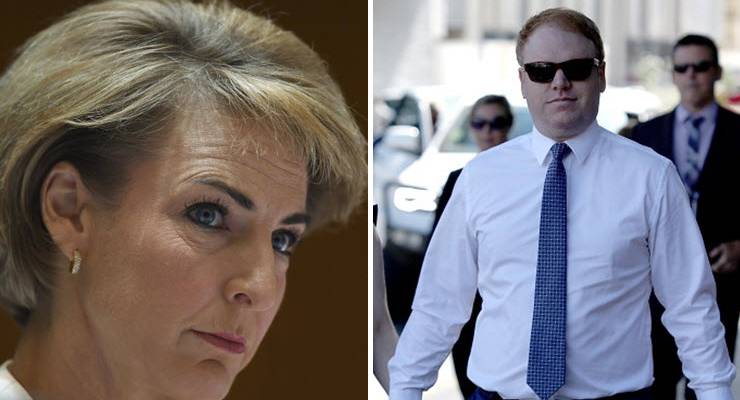
Attorney-General Michaelia Cash has played down her powers to intervene in whistleblower prosecutions, such as the one against Australian Taxation Office whistleblower Richard Boyle, saying the powers have “never been used” and are reserved for “very unusual” circumstances.
Boyle is facing life in prison for speaking out about unethical debt collection practices inside the ATO. Cash’s comments are another blow to hopes that the government would offer clemency to the public servant, who last month was put on a pathway to trial despite prosecutors earlier suggesting they might drop the case.
Under the Judiciary Act, the attorney-general has the power to intervene in a matter to discontinue prosecutions.
But in a statement from her office, Cash told Crikey that these powers were reserved for “very unusual and exceptional circumstances”.
“The [Commonwealth Director of Public Prosecutions (CDPP)] takes decisions about the commencement of prosecutions independently of government, in line with the published Prosecution Policy of the Commonwealth,” she said.
Cash added that the particular section of the Judiciary Act “predates the [CDPP] and has not been used since the CDPP’s establishment”.
The attorney-general also has powers to stop prosecutions under the Director of Public Prosecutions Act. But Cash said these separate powers had “never been used to direct the CDPP in relation to a particular case”.
“The Prosecution Policy requires the CDPP to be satisfied that it would be in the public interest,” she said.
“As such, it would not be appropriate for me to comment on any decision made by the CDPP with respect to commencement of a prosecution.”
Times change
Cash has not always been so apathetic about the plight of whistleblowers.
In 2016 she was personally responsible for signing a deal with Nick Xenophon Team, now Centre Alliance, to introduce major protections for whistleblowers in both the corporate and public sectors. The deal was part of negotiations that secured the passing of Malcolm Turnbull’s controversial Australian Building and Construction Commission bill.
While corporate sector protections were introduced under Turnbull minister Kelly O’Dwyer, public sector reforms have never materialised.
The government says it is working to implement reforms but there is no sign of when they will be implemented, leaving the door open to more public sector whistleblowers facing the same plight as Boyle.
Crikey asked Cash why the government had not yet introduced the reforms as promised under the 2016 agreement, but she declined to comment.
Not going away
The need for whistleblower protections is again in the spotlight after the CDPP doubled down on its prosecution of Boyle. The CDPP hinted in March that it was considering dropping the charges against him, but then indicated last month it was continuing its pursuit.
As AG, Cash could also withdraw her approval of the prosecutions of two other whistleblowers — intelligence officer Witness K and his lawyer Bernard Collaery — who face lengthy jail terms for their role in exposing the Australian Government’s illegal bugging of the Timor-Leste cabinet. There is another hearing into the matter next week.
That seems less likely since the government is trying to make sure the trial is kept secret, ostensibly on the grounds of national security, with Cash’s predecessor Christian Porter routinely criticised for obstructing the trial.
Can we expect an AG from the Coalition — or any party — to intervene in Australia’s whistleblower prosecutions? Let us know your thoughts by writing to letters@crikey.com.au. Please include your full name to be considered for publication in Crikey’s Your Say section.








Whistle blowers upset the status quo. Hence the status quo will always go after them with everything they can. Any support for whistle blowers has to come from outside the status quo. In other words ordinary people organising themselves to aggitate. Expect no help from government or other conservative groups.
True, not far away from Australia whistle blowers are met with bullets.
https://youtu.be/6amRqbEj4rs
Whos’s got the biggest balls of them all?
I’m going back to sat ire. It makes more sense!
It always did which is why it is so dangerous to the status quo… as noted by Peter Cook, Tom Lehrer et al.
cash of the whiteboards? What qualifications does this apparatchik have that would qualify her to be the chief law officer of the commonwealth?
She’s as awful as the boys and they appreciate it.
Whistleblowers improve the world for the rest of us. They are GREAT. It takes guts. To punish them is despicable and the act of total aholes who should be locked up themselves. Spread the word.
After (presumably) doing one’s homework (“studying the form”) of this mob, why/how would anyone enter into a deal/agreement with Cash, or anyone else in this government, expecting them to honour their side of it?
They make “(The) Honorable” laughable.
Why is this government prosecuting whistleblowers who point out illegal or unethical practices and yet is so reluctant to prosecute or discipline those who commit these actions ? Seems it’s because they don’t like being caught out either breaking the law or their ethics don’t pass the pub test. Typical hypocrisy !
It fears the bad publicity generated when the details of it’s ‘business as usual’ business model is brought out into the open.
Hypocrisy = LNP.
They are experts at it